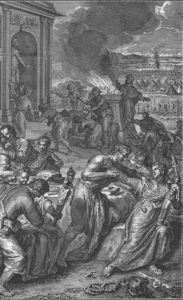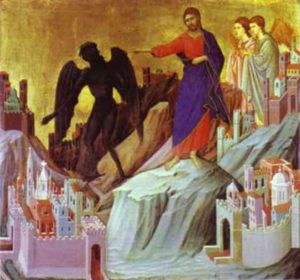We know that you all will be praying for wisdom, strength and healing for so many worldwide that are affected by the corona virus pandemic.
READING FROM THE OLD TESTAMENT – Numbers 30-31:54
We are called to be men and women of our word. We are created in God’s image. He is a covenant-keeping God. He is a God who makes no promise that He will not keep.
There is an interesting set of laws given in Numbers 30 designed to promote unity in the home. These are laws pertaining to vows.
When vows are made, they are not to be broken. Vows are to be regarded as sacred. A man is bound to his vow. If promises are made, they are not to be broken.
However, there is a principle in Numbers 30 reminding us that there are not to be two supreme governing authorities within a household. A father is given the right to overrule a commitment or vow made to the Lord by a daughter. But he must affirm or overrule the vow on the day he hears of it. He is her protector while she still lives under his roof. He is also the appointed authority unto the Lord pertaining to the various commitments made by household members. This is necessary if there is to be unity in the home.
A husband is given the same right regarding any vow or commitment that he learns that his wife has made. The father and/or husband should seek to understand the nature of the vow made by his daughter or wife and discern whether she should be released from that vow. He needs to consider the interests of the Lord and other members of the household. Decisions should not be left “up in the air”. He can release her from her obligation to a vow “on the day he hears of it”. He is to be held accountable as the household manager. Each household is to reflect God’s order.
Paul writes in 1 Corinthians 11:3 3 But I want you to understand that Christ is the head of every man, and the man is the head of a woman, and God is the head of Christ.
The head of the household is to be honored “as it is fitting in the Lord”.
The New Testament principle is that the entire household of faith should practice simple integrity. In the Inter-Testamental Period, the laws pertaining vows became more complex than what was written in the law of Moses. Jesus brings these laws back to the essential characteristic of mirroring God’s faithfulness.
Matthew 5:33-37 (NASB) 33 “Again, you have heard that the ancients were told, ‘YOU SHALL NOT MAKE FALSE VOWS, BUT SHALL FULFILL YOUR VOWS TO THE LORD.’
34 “But I say to you, make no oath at all, either by heaven, for it is the throne of God,
35 or by the earth, for it is the footstool of His feet, or by Jerusalem, for it is THE CITY OF THE GREAT KING. 36 “Nor shall you make an oath by your head, for you cannot make one hair white or black. 37 “But let your statement be, ‘Yes, yes’ or ‘No, no’; anything beyond these is of evil.
One of Moses’ last tasks is a somber one. A huge number of Israelites had been killed as a result of the enemy’s plot to destroy them as a nation. The evil prophet, Balaam, persuaded the Midianite government to seek the complete destruction of the Israelites with an aggressive attack on everything that held them together as a nation- their faith in Yahweh, their obedience to the Law, the sanctuary, their marriages, their families, their personal purity and their covenant relationships with God and each other.
Who were the Midianites? They were descendants of Abraham through Keturah. They lived around the Gulf of Aqaba. With a few exceptions, the Midianites had been hostile enemies of Israel for years. Balaam was a resident of Moab and Midian. When he realized that he could not pronounce a curse upon Israel, he devised a plan for Israel to bring a curse upon itself. He went to the Midianites and advised them to seduce the Israelite men into unfaithfulness to YAHWEH.
Revelation 2:14 (NASB) 14 ~’But I have a few things against you, because you have there some who hold the teaching of Balaam, who kept teaching Balak to put a stumbling block before the sons of Israel, to eat things sacrificed to idols and to commit acts of immorality.
Somehow a large number of Midianite women were influenced or coerced by the Midianite government to be unfaithful to their own husbands and families and become schooled in the art of seduction, enticing the Israelite men through sexual lust to participate in the ritual worship of Baal Peor (Numbers 31:1). In doing this, the Israelites broke their covenant with God, broke covenant with their wives and families, and brought a plague of destruction upon themselves and their nation.
The enemy often uses temptation to impurity to move people away from the worship of the one true God. We see this in today’s advertising industry. “Sex sells” is their modus operandi. The appeal to lust is the strategy to destroy any sure footing of moral sensibility.
God sought vengeance upon those who deceived the Israelites. The Hebrew word ‘nakal’ denotes premeditated, deliberate plotting.
Numbers 25:17-18 (NASB) 17 “Be hostile to the Midianites and strike them; 18 for they have been hostile to you with their tricks, with which they have deceived you in the affair of Peor and in the affair of Cozbi, the daughter of the leader of Midian, their sister who was slain on the day of the plague because of Peor.”
It is hard to imagine the scale and the seriousness of the crime that the Midianites had perpetrated against Israel. It was akin to having a government sponsored program to expose a healthy population to a deadly infectious disease. These Midianites destroyed their own family loyalties to destroy those of another nation. It was a depersonalizing and a de-humanizing atrocity for all who participated.
The Midianites, and especially the 6 to 12,000 women, were responsible for leading the Israelites into immorality and idolatry. But the Israelites were also to blame.
The Divine Retribution against both the Midianites and the Israelites reminds us of God’s view upon the serious sin of idolatry and its devastating impact on one’s personal, social and national life.
Verse 7 says that they killed every male. This was not every male in the entire Midianite nation, but every male in the subtribe that was responsible for the atrocity that had been committed against Israel. This is made obvious by the fact that Gideon battles the Midianites in the Book of Judges, Chapter 7.
The judgment for the atrocity at Baal-Peor did not only fall upon the Midianites. Israel lost about 24,000 members of its adult population.
Phineas, the son of Eleazar the priest, leads the army of 12,000 men into battle; 1,000 fighting men from each tribe. The five Midianite kings and the false prophet Balaam are put to death with the sword. Moses was driven to anger because the women, whose premeditated, government -facilitated prostitution caused the plague, were being spared (31:15). This was contrary to what God required. Their obedience was compromised.
The plunder was taken and distributed. Half of the plunder was given to the fighting men, the other half to the people. Of the share given to the people, one of every 50 prisoners or animals was given to the Levites who maintained the Lord’s tabernacle.
READING FROM THE NEW TESTAMENT– Luke 4:1-30
Luke traces the genealogy of Jesus back to the first man, Adam. Remember, from God’s point of view there have only been two men; men as He as God created men to be- without sin; Adam, the first man, and Jesus, the second man (1 Cor 15:47). Adam, the first man, was created in a state of untried innocence. Jesus was born without sin. All others, from God’s point of view, are born in a state that falls short of His original intention and therefore fallen mankind could be considered from His perspective as sub-human, while not negating their value as created in God’s image. Luke traces Jesus’ ministry along the line of Adam, the first man’s journey. The first man Adam was tempted in the garden and brought humanity into the barren wilderness. The second man is tempted in the barren wilderness in order to bring humanity back to paradise.
When God made man, He made him male and female, a community of oneness designed to reflect the community of oneness within the Godhead. The woman was not named Eve until after the fall. Prior to the fall she shared the name of the man, Adam. It is a further indication of their original oneness.
The temptations that Jesus faced in the wilderness are similar to that of the first Adam-The lust of the flesh (appetite), the lust of the eye (attraction) and the pride of life (ambition) (1 John 2:16).
The woman in the garden saw that the tree was good for food- a means to satisfy hunger at the expense of obedience. The man in the wilderness when he was hungry chose to live by every word that proceeded out of the mouth of God rather than command stones to be bread. He would not satisfy His hunger apart from a disposition of obedience and trust towards the Father. He would not bow to the Tempter.
The woman in the garden saw that the fruit of the tree was attractive, a delight to the eyes. The man in the wilderness saw all the glory of the kingdoms of this world and realized they could not compare with the glory stored up for those who worship God alone.
The woman in the garden saw that the tree was desirable to make one wise. She believed that she could prove herself to be wise, with worldly wisdom rather than God’s wisdom. The man in the wilderness saw that merely to act on a Scripture, especially when it is given out of context, does not qualify as obedience, and therefore is not the wisdom of God. He refuses Satan’s request to try to prove Himself.
Where the first Adam failed, the last Adam succeeded against the Tempter.
Hebrews 4:15 (NASB) 15 For we do not have a high priest who cannot sympathize with our weaknesses, but One who has been tempted in all things as we are, yet without sin.
It is important to note that although Jesus was victorious in these three temptations, Jesus was not through with temptations.
Luke 4:13 (NASB) 13 When the devil had finished every temptation, he left Him until an opportune time.
This reminds us to be ever on guard. The devil is not through with us. The enemy recognizes opportune times to bait us with temptation.
Jesus’ public ministry begins with his regular custom of going to the synagogue. His Scripture reading became His Messianic announcement.
The first part of His message is the only one that is well received by those in His hometown.
Luke 4:22 (NASB) 22 And all were speaking well of Him, and wondering at the gracious words which were falling from His lips; and they were saying, “Is this not Joseph’s son?”
They thought the message was exciting and perhaps it appealed to their pride. But then Jesus confronts them with the hard facts. The history of Israel proved that prophets were not honored in their hometowns. Then Jesus taught how God has repeatedly shown favor to the unlikely people, even those who were outside the covenant. When He demonstrated that God showed favor to the Gentiles over the hometown Israelites, their pride was threatened, and they turned on Jesus.
Luke 4:28-29 (NASB) 28 And all the people in the synagogue were filled with rage as they heard these things; 29 and they got up and drove Him out of the city, and led Him to the brow of the hill on which their city had been built, in order to throw Him down the cliff.
READING FROM PSALMS: PSALM 63
The Psalmist expresses his hunger for knowing God- to be refreshed in His presence (v.1) to behold His perfection (v.2), to be upheld by His unfailing love (v.3) and to know His comfort, His counsel and His delivering power as the Divine Helper (v.7).
Here is a man who has found full satisfaction in God and has something to be forever singing about!
Psalm 63:5 (NIV) 5 My soul will be satisfied as with the richest of foods; with singing lips my mouth will praise you.
The whole bent of His life is to delight in the Lord. The words he chooses imply that it requires some tenacity on his part. Yet even as he presses in, to experience God’s nearness, he discovers he is being both drawn and upheld.
Psalm 63:8 (NIV) 8 My soul clings to you; your right hand upholds me.
TODAY’S READING FROM PROVERBS
Proverbs 11:20-21 (NASB) 20 The perverse in heart are an abomination to the LORD, But the blameless in their walk are His delight. 21 Assuredly, the evil man will not go unpunished, But the descendants of the righteous will be delivered.
PRAYING FOR THE NATIONS (Using the Prayer Guide “Operation World” p.173-176)
BULGARIA
Republic of Bulgaria
Europe
Geography
Area: 110,912 sq. km
Balkan state adjoining Turkey, Greece, Macedonia, Serbia and Romania.
Population: 7,497,282 Annual Growth: -0.63%
Capital: Sofia
Urbanites: 71.7%
HDI Rank: 61 of 182 (UN Human Development Reports 2009)
Answer to Prayer
Significant growth of evangelical and charismatic believers. Evangelicals went from 0.4% of the population in 1980 to close to 2% today. Growth was significant in the 1990s and, with overall population decline, even maintaining the plateaued numbers since 2000 can be seen as progress.
Bulgaria’s move towards EU membership had an opening effect in the religious sphere.
Challenge for Prayer
Bulgaria’s troubled past is not yet completely behind. Corruption and powerful organized crime syndicates persist. Poverty is widespread as is divorce and abortions. There are more abortions than live births. Many of the youngest and brightest emigrate seeking jobs and money. Pray that wholeness will come to this nation as only the transforming gospel can bring.
The Orthodox Church needs renewal and new life. A bitter schism weakened and undermined the Church, stemming from the collusion of Orthodox leaders with the former Communist regime. Disunity persists, even at the local level. Orthodoxy is still largely equated to a Bulgarian identity, but this is changing as other religious groups take root and grow. Pray for a genuine move of the Holy Spirit that brings reconciliation of rifts and a full realization of Orthodoxy’s spiritual richness.
PRAYER: Our Father, we set apart in reverence Your Holy Name and ask that You be honored in our lives. May Your kingdom come, and Your will be done on earth as it is in heaven. Supply us with our needs and help us to quickly forgive as we have been forgiven. Lord, help us to recognize the subtle craftiness of the enemy. Help us to discern his strategies and say ‘no’ to idolatry. May we repudiate the lust of the eyes, the lust of the flesh and the pride of life. Lead us not into temptation and deliver us from the Evil One. For Yours is the kingdom, the power and the glory. With our singing lips and thankful hearts, we give You praise, in Jesus’ Name. Amen.
Pastor David
NEW LIFE COMMUNITY CHURCH, CONCORD
